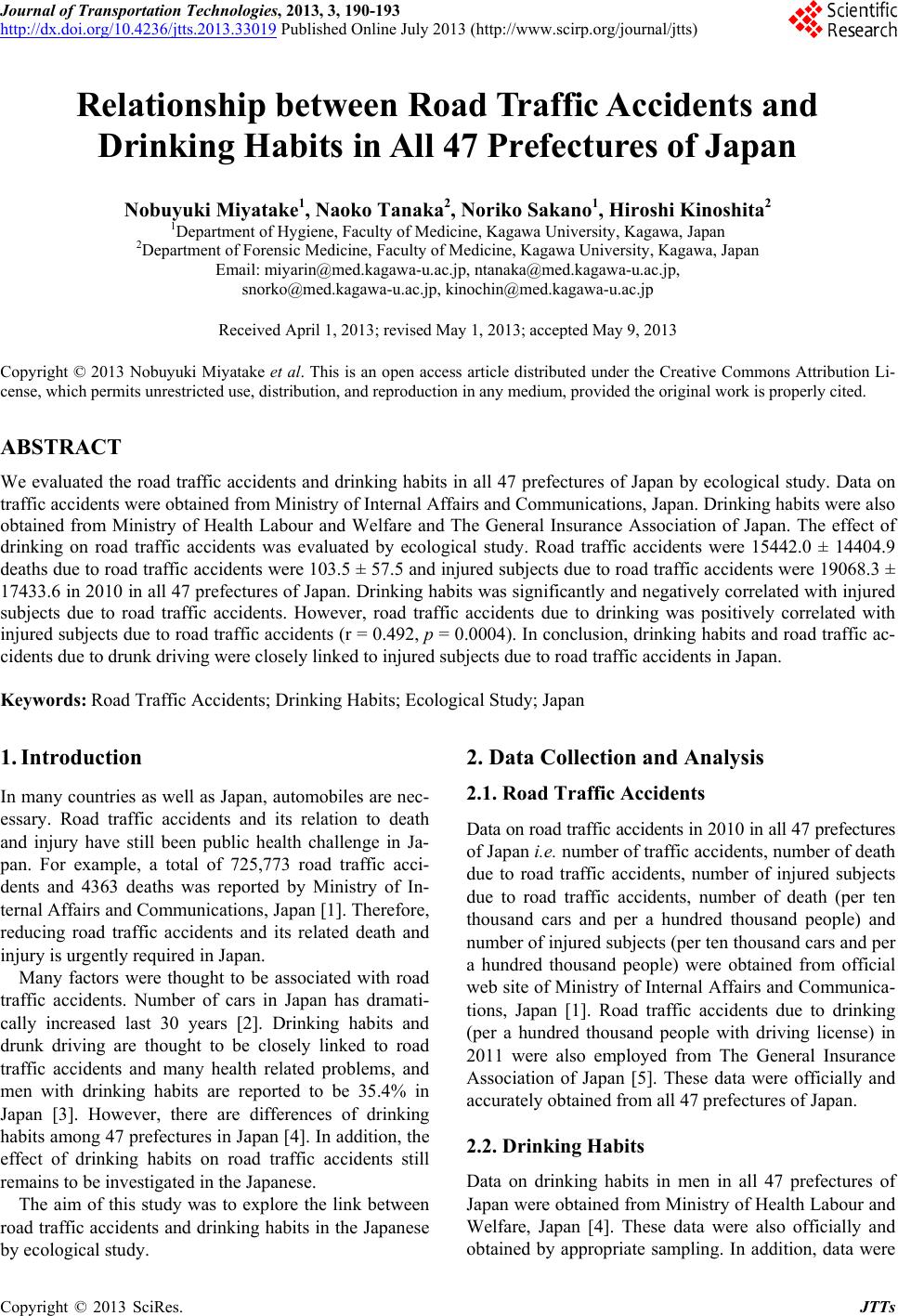
Journal of Transportation Technologies, 2013, 3, 190-193
http://dx.doi.org/10.4236/jtts.2013.33019 Published Online July 2013 (http://www.scirp.org/journal/jtts)
Relationship between Road Traffic Accidents and
Drinking Habits in All 47 Prefectures of Japan
Nobuyuki Miyatake1, Naoko Tanaka2, Noriko Sakano1, Hiroshi Kinoshita2
1Department of Hygiene, Faculty of Medicine, Kagawa University, Kagawa, Japan
2Department of Forensic Medicine, Faculty of Medicine, Kagawa University, Kagawa, Japan
Email: miyarin@med.kagawa-u.ac.jp, ntanaka@med.kagawa-u.ac.jp,
snorko@med.kagawa-u.ac.jp, kinochin@med.kagawa-u.ac.jp
Received April 1, 2013; revised May 1, 2013; accepted May 9, 2013
Copyright © 2013 Nobuyuki Miyatake et al. This is an open access article distributed under the Creative Commons Attribution Li-
cense, which permits unrestricted use, distribution, and reproduction in any medium, provided the original work is properly cited.
ABSTRACT
We evaluated the road traffic accidents and drinking habits in all 47 prefectures of Japan by ecological study. Data on
traffic accidents were obtained from Ministry of Internal Affairs and Communications, Japan. Drinking habits were also
obtained from Ministry of Health Labour and Welfare and The General Insurance Association of Japan. The effect of
drinking on road traffic accidents was evaluated by ecological study. Road traffic accidents were 15442.0 ± 14404.9
deaths due to road traffic accidents were 103.5 ± 57.5 and injured subjects due to road traffic accidents were 19068.3 ±
17433.6 in 2010 in all 47 prefectures of Japan. Drinking habits was significantly and negatively correlated with injured
subjects due to road traffic accidents. However, road traffic accidents due to drinking was positively correlated with
injured subjects due to road traffic accidents (r = 0.492, p = 0.0004). In conclusion, drinking habits and road traffic ac-
cidents due to drunk driving were closely linked to injured subjects due to road traffic accidents in Japan.
Keywords: Road Traffic Accidents; Drinking Habits; Ecological Study; Japan
1. Introduction
In many countries as well as Japan, automobiles are nec-
essary. Road traffic accidents and its relation to death
and injury have still been public health challenge in Ja-
pan. For example, a total of 725,773 road traffic acci-
dents and 4363 deaths was reported by Ministry of In-
ternal Affairs and Communications, Japan [1]. Therefore,
reducing road traffic accidents and its related death and
injury is urgently required in Japan.
Many factors were thought to be associated with road
traffic accidents. Number of cars in Japan has dramati-
cally increased last 30 years [2]. Drinking habits and
drunk driving are thought to be closely linked to road
traffic accidents and many health related problems, and
men with drinking habits are reported to be 35.4% in
Japan [3]. However, there are differences of drinking
habits among 47 prefectures in Japan [4]. In addition, the
effect of drinking habits on road traffic accidents still
remains to be investigated in the Japanese.
The aim of this study was to explore the link between
road traffic accidents and drinking habits in the Japanese
by ecological study.
2. Data Collection and Analysis
2.1. Road Traffic Accidents
Data on road traffic accidents in 2010 in all 47 prefectures
of Japan i.e. number of traffic accidents, number of death
due to road traffic accidents, number of injured subjects
due to road traffic accidents, number of death (per ten
thousand cars and per a hundred thousand people) and
number of injured subjects (per ten thousand cars and per
a hundred thousand people) were obtained from official
web site of Ministry of Internal Affairs and Communica-
tions, Japan [1]. Road traffic accidents due to drinking
(per a hundred thousand people with driving license) in
2011 were also employed from The General Insurance
Association of Japan [5]. These data were officially and
accurately obtained from all 47 prefectures of Japan.
2.2. Drinking Habits
Data on drinking habits in men in all 47 prefectures of
Japan were obtained from Ministry of Health Labour and
Welfare, Japan [4]. These data were also officially and
obtained by appropriate sampling. In addition, data were
C
opyright © 2013 SciRes. JTTs